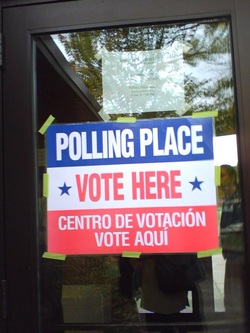
Is it time to do our civic duty in our pajamas? Will we at last be able to message our friends, watch a Youtube video and cast a ballot at the same time, trying hard not to accidentally “like” a presidential candidate and “vote” for “Charlie bit my finger,” instead of the other way around?
It’s been nearly 14 years since I first wrote about this. That was in the context of the 2000 presidential election, in which rooms full of Florida election judges tried to decide the fate of the presidency by examining punch cards that hadn’t been punched very well. At the time, I interviewed Scott Howell, a Democratic state senator who worked for IBM. He predicted Internet voting would be a reality within two years.
| | To be fair, the world seemed a bit skewed at the time. It was easy to contemplate just about anything happening to fix what seemed like a never-ending crisis in democracy. But all these years later you may be interested in knowing people have not given up on the idea, notwithstanding the NSA, the Target credit card scandal and all that malware on your computer. In their just-completed annual session, Utah lawmakers rejected a bill that would have tried to make the state’s presidential primary the first in the nation. That was a good thing, given the havoc that would have ensued if the greatest republic on earth were to face the prospect of winnowing its presidential candidates through a different small, politically insignificant state than Iowa or New Hampshire. But a part of the failed bill that didn’t get a lot of attention would have given the Legislature the power to direct that the primary be held electronically. Technically, the state already does this with its “electronic” voting machines. But the bill clearly contemplated online voting, and its co-sponsor, Sen. Curtis Bramble, told the Deseret News he wants to continue working on that part of the bill, which means people in state government are working on it. Lt. Gov. Spencer Cox, whose office is responsible for elections, told me there is an air of inevitability to the idea. At about the time I wrote that column quoting Howell, Cox was a taking an election law class in college and writing a paper on Internet voting. He remembers thinking it would be a reality in about five years. Now his office is working on it. Mark Thomas, the state’s director of elections, said, “We’ll be sitting down with county clerks and technology folks and thinking what we can do long-term. The voting equipment we have now is not going to last forever.” There are two rather interesting roadblocks that have kept the idea from maturing through the years. One is the federal government. Elections are run by states, not Washington. But Washington has granted money for states to experiment with electronic voting. Thomas said Utah’s portion of that money has come with explicit prohibitions against using it for full online voting. Service members overseas can fill out Utah ballots over the Internet, but they have to either print them out and send them in or convert them into a format that can be emailed. It’s probably comforting to know that the people who built healthcare.gov are hesitant about voting by website. Maybe they are not beyond learning lessons from failure. But the other obstacle, at least in Utah, is philosophical. A lot of people think voting should take more effort than just opening an app on a phone or clicking a mouse. I have been in that camp. Civic duty should require some effort. Voting shouldn’t be a whim. Cox disagrees. “I see voting as a gateway to greater participation in voting. I think we need to remove barriers, and electronic voting is one way to do that,” he said. He also isn’t convinced that everyone who treks to a polling station on Election Day is necessarily informed. And so I say again as I did in 2000, that those who think this is inevitable are probably right. Other countries are already farther along on this than we are. Sure, someone in the Philippines is probably working on a virus that will make Imelda Marcos our president. But Internet voting will be here some day, and probably sooner than we expect. There is some comfort to this. Think of all those TV network folks trying to do exit polls when the only thing people are exiting is an application. |

 RSS Feed
RSS Feed

